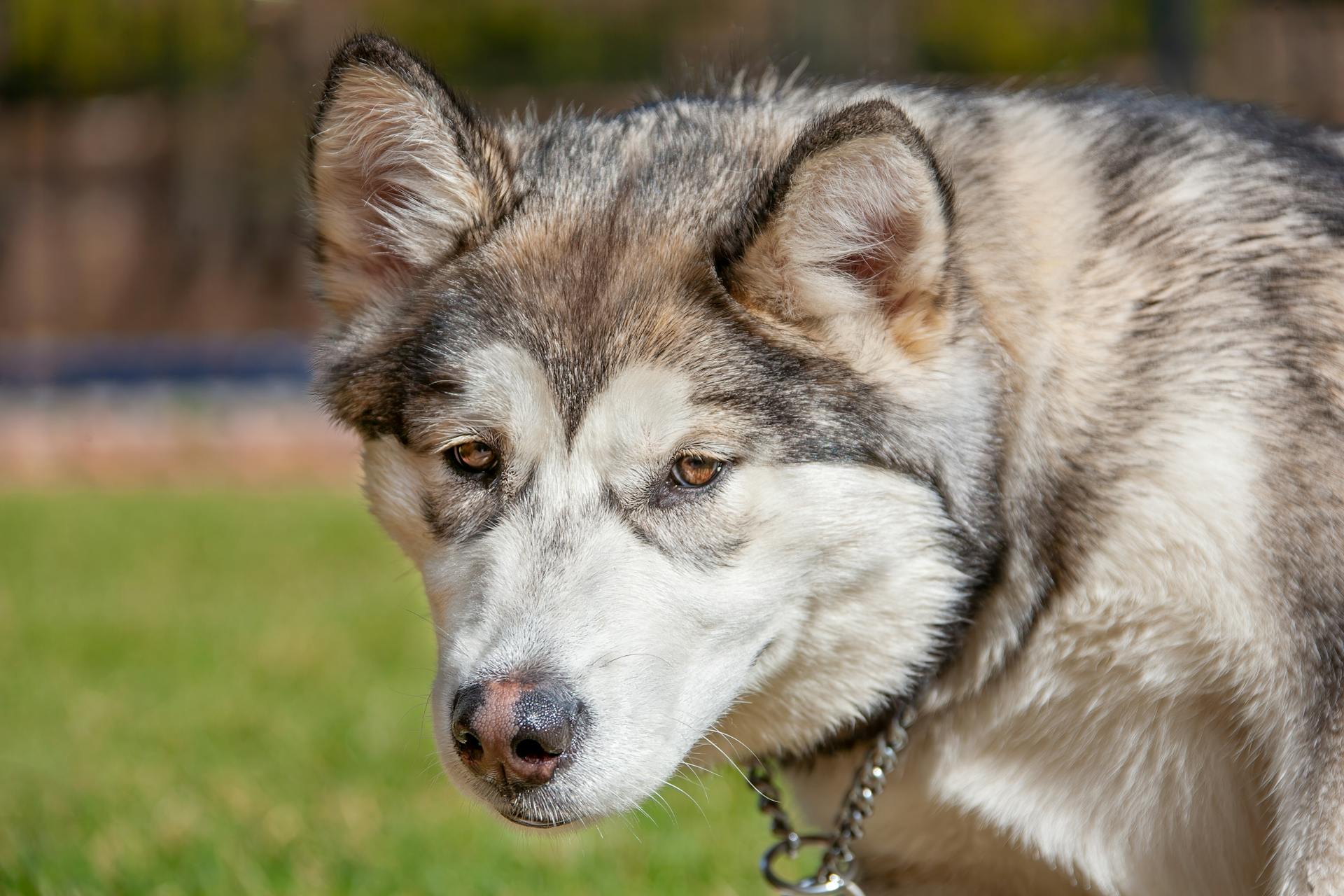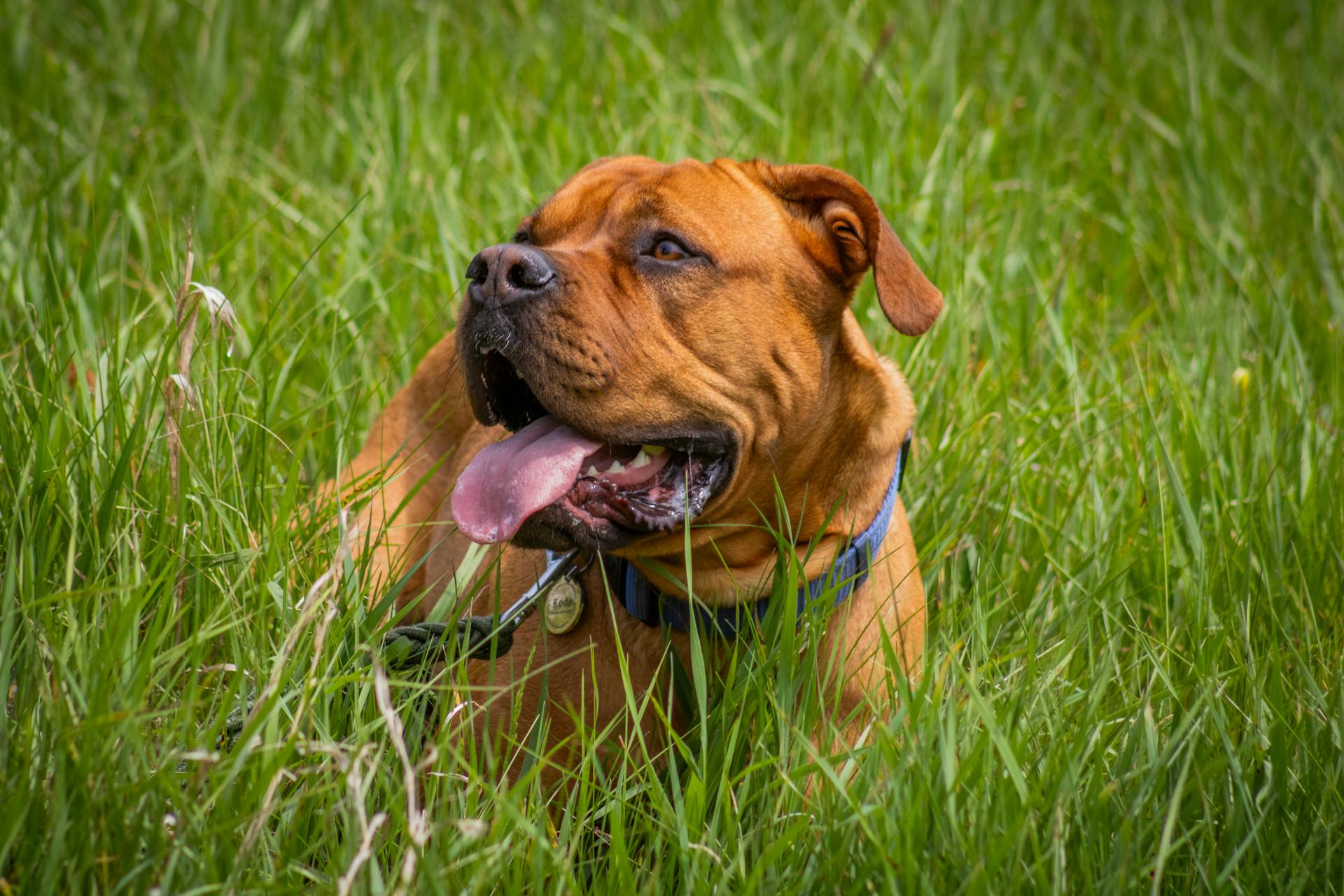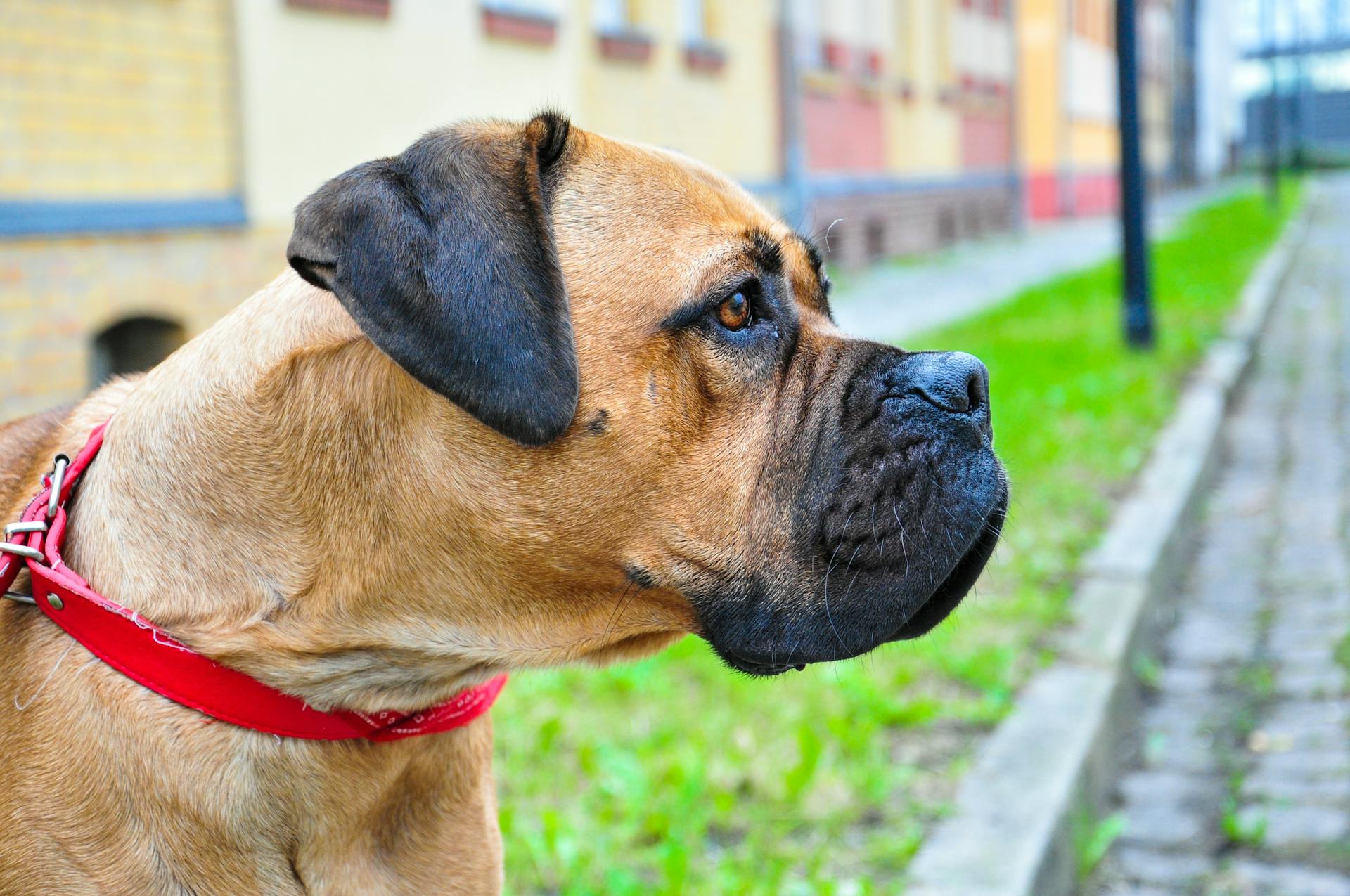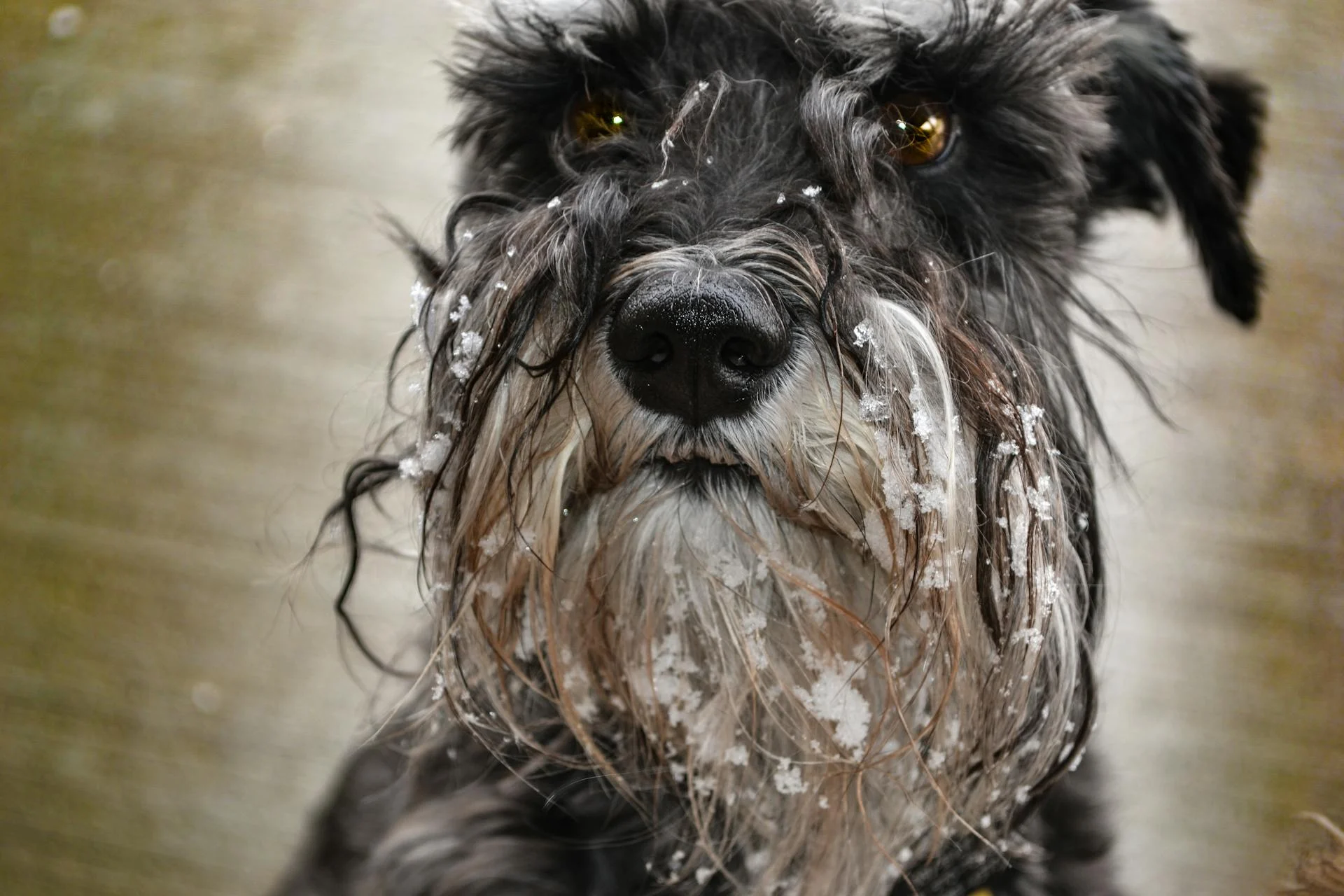
Giant Schnauzer puppies are a handful, but with the right care and training, they can grow into well-behaved and loving companions.
Giant Schnauzers are a high-energy breed that requires regular exercise to stay happy and healthy. They need at least 30 minutes of exercise per day, which can include walks, runs, and playtime in the yard.
Training a Giant Schnauzer puppy requires patience, consistency, and positive reinforcement. They are intelligent and trainable, but can be stubborn at times.
Breed Characteristics
The Giant Schnauzer is a large breed, typically weighing between 65 to 90 pounds (29 to 41 kilograms).
They have a distinctive coat, consisting of a harsh and wiry outer coat with a dense, soft undercoat. This requires moderate maintenance, with regular brushing and occasional hand-stripping to keep it looking its best.
In terms of temperament, Giant Schnauzers are intelligent, loyal, and protective. They're often used as working dogs and family guardians, making them a great addition to active families.
Here are some key characteristics to consider:
Quick Facts
The Giant Schnauzer is a breed that's sure to make a big impression. They typically weigh between 65 to 90 pounds and stand tall with a large build.
Originating from Germany, these dogs have a rich history and a unique appearance. Their harsh and wiry outer coat with a dense, soft undercoat requires regular grooming to maintain its appearance.
With a lifespan of around 12 to 15 years, Giant Schnauzers are a long-term commitment. They're highly trainable due to their intelligence, but they require consistent and firm handling.
If you're considering bringing a Giant Schnauzer into your family, be prepared for regular exercise and mental stimulation to keep them thriving. They need high levels of physical activity to stay happy and healthy.
Here's a quick rundown of the breed's exercise needs and grooming requirements:
- Exercise Needs: High
- Grooming: Moderate maintenance
Regular veterinary care is essential to prevent certain genetic health issues, such as hip dysplasia and bloat. With proper care, your Giant Schnauzer can live a long and happy life.
Discover more: Shih Tzu Puppy Care
Size
When it comes to the size of a Giant Schnauzer, it's quite impressive. A male Giant Schnauzer stands 25.5 to 27.5 inches at the shoulder.
The weight of a male Giant Schnauzer can range from 60 to 80 pounds. This is quite a bit of dog!
Females are slightly smaller, measuring 23.5 to 25.5 inches at the shoulder. Some females can weigh as little as 55 pounds.
Some Giant Schnauzers can be smaller or larger than average, so keep in mind that every dog is unique.
Health and Care
Giant Schnauzer puppies are generally healthy, but like all breeds, they can be prone to certain health conditions. Hip dysplasia is a heritable condition that can cause arthritis, and it's essential to have your puppy screened for this condition.
Hip dysplasia can be worsened by environmental factors, such as rapid growth from a high-calorie diet or injuries incurred from jumping or falling on slick floors. To minimize the risk, feed your puppy a balanced diet and provide plenty of exercise.
Here's an interesting read: Bernese Mountain Dog Hip Dysplasia
Autoimmune thyroiditis is a heritable condition that can cause hypothyroidism, a condition where the body doesn't produce enough thyroid hormones. Signs can include dry skin and coat, hair loss, weight gain, or behavioral changes. Treatment is typically daily oral medication.
Here are some common health issues that can affect Giant Schnauzers:
- Hip and Elbow Dysplasia: A Giant Schnauzer's size makes them prone to hip dysplasia and elbow dysplasia, both of which often result in arthritis.
- Osteochondritis Dissecans (OCD): This developmental condition occurs when cartilage does not turn to bone as it should during the growth process.
- Von Willebrand Disease: Von Willebrand disease is a blood clotting disorder frequently found in Giant Schnauzers.
Health Needs
Giant Schnauzers are generally a healthy breed, but like all breeds, they can be prone to certain health issues. Hip dysplasia is a heritable condition that can cause arthritis and pain in the rear legs.
Hip dysplasia can be detected through X-ray screening by the Orthopedic Foundation for Animals or the University of Pennsylvania Hip Improvement Program. Dogs with hip dysplasia should not be bred.
Osteochondrosis Dissecans (OCD) is another condition that can affect Giant Schnauzers, causing a painful stiffening of the joint in the elbows or shoulders.
Autoimmune Thyroiditis is a heritable condition that can cause hypothyroidism, leading to symptoms such as obesity, mental dullness, and hair loss. Treatment is typically daily oral medication.
Recommended read: Are Standard Schnauzers Good Guard Dogs

Squamous Cell Carcinoma is a type of cancer that can occur on the toes of dark-haired Giant Schnauzers, often causing lameness. Early detection and removal of the affected toe can increase the chance of survival.
A reputable breeder will be honest and open about health problems in the breed and the incidence with which they occur in their lines.
Here's a list of common health issues in Giant Schnauzers:
- Hip Dysplasia: $1,500-$6,000 to diagnose and treat
- Elbow Dysplasia: $1,500-$4,000 to diagnose and treat
- Gastric Dilatation Volvulus (Bloat): $1,500-$7,500 to diagnose and treat
- Panosteitis: $200-$800 to diagnose and treat
The best time to get pet insurance for your Giant Schnauzer is when he's a healthy puppy, as it can help cover the cost of hereditary conditions that may arise later in life.
Diet
Diet is a crucial aspect of your Giant Schnauzer's health, and it's essential to get it right. A high-quality commercial dog food suitable for your Giant Schnauzer's size, height, and age is the best choice.
Giant Schnauzers can live up to 15 years, so you want to make the most of that time by feeding them a diet that promotes longevity. A higher-protein diet is ideal.
Obesity is a significant health problem in Giant Schnauzers, and it's easy to overfeed them. Resist the temptation to give them leftover people food or loads of dog treats.
Consult with your veterinarian to determine the best food brand, portion size, and feeding schedule for your Giant Schnauzer.
See what others are reading: Are Miniature Schnauzers Good Dogs
Training and Behavior
Giant Schnauzer puppies are born cooperative and naturally engaged, making them a star student at puppy school.
Consistency is key when training a Giant Schnauzer. They need a job to do and without one, they won't make a good first-time pet.
You'll need to find their motivations, whether it's praise, rewards, or play, and dedicate training time every day. This can include socialization with agility courses or high-energy exercises like hiking.
Giant Schnauzers require consistent and firm guidance to prevent them from thinking for themselves and running the household. Without it, they're quite capable of taking charge.
Early socialization is crucial to ensure your Giant Schnauzer puppy grows up to be a well-rounded dog. This includes exposure to many different people, sights, sounds, and experiences when they're young.
If socialization and exercise needs aren't met, Giant Schnauzers will create their own job, which may be difficult to undo. Digging holes and destroying furniture or slippers are not unheard of.
Giant Schnauzers are highly intelligent and can be mischievous, especially if they're not given a job to do. Make sure you give them a job that you approve of, like fetching your slippers or the morning paper.
Worth a look: When Is Best Time to Breed Dog
Care and Upkeep
Giant Schnauzer puppies require a lot of exercise, at least an hour of daily exercise to be exact. This can be met with vigorous games, long hikes, or walks.
Their high energy levels mean they need a home with a fenced yard where they can safely run off some of that energy. They're not suited for apartments or condos.
Giant Schnauzers need to be trained to do tricks or help you around the house to prevent destructive behavior. They don't like to be bored, so training should be a challenging game to keep them engaged.
Their coat requires regular brushing, at least three times a week, to prevent mats from forming in the undercoat. Brushing should be done with a stiff bristle or slicker brush.
Daily teeth brushing and nail trimming are also essential for their health. Brush their teeth with dog-specific toothpaste, and trim their nails weekly.
A unique perspective: Brush for Schnauzer
Care
Giant Schnauzers are high-energy dogs that require at least an hour of daily exercise, which can be met with vigorous games and long hikes or walks.
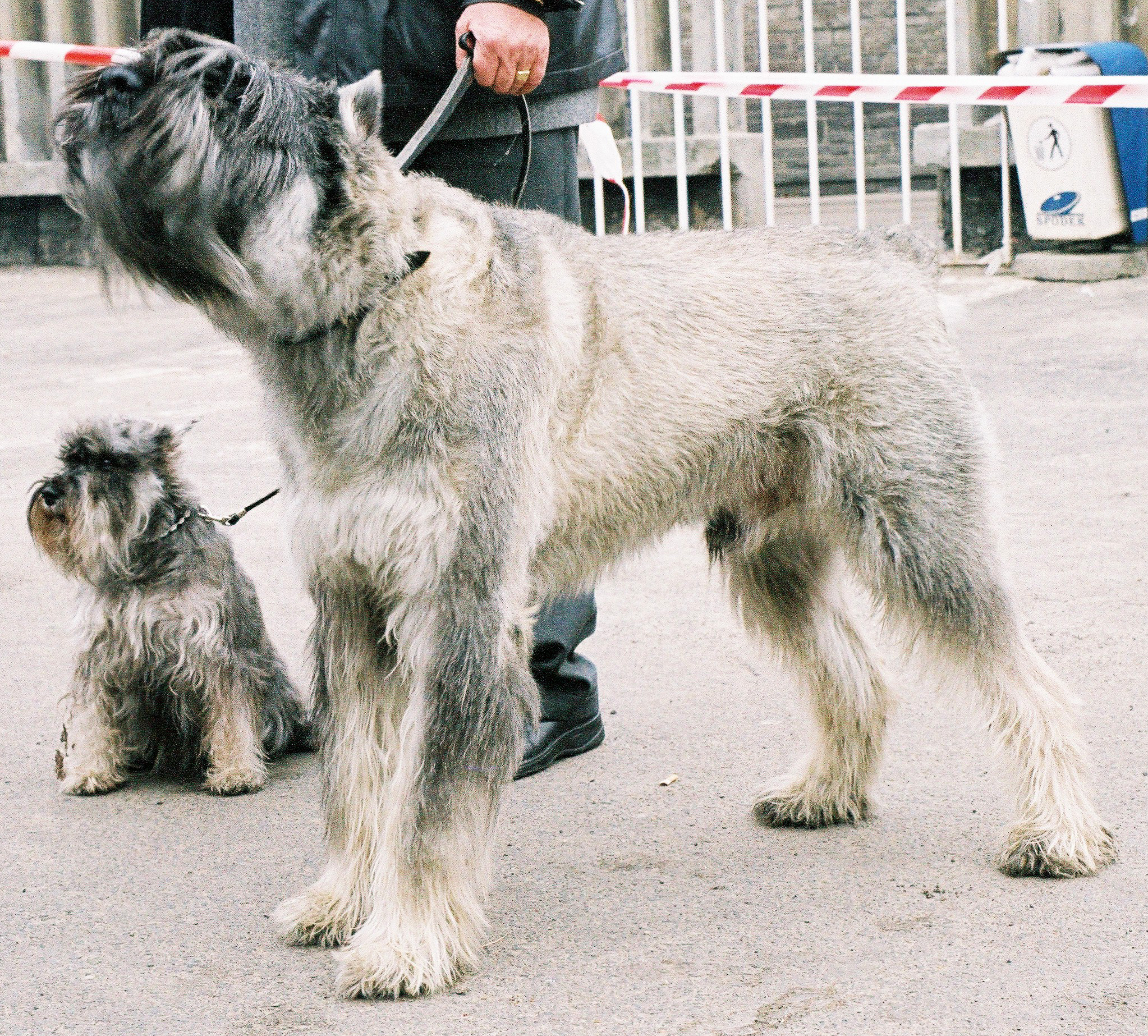
To prevent destructive behavior, train your Giant Schnauzer to do tricks or help you around the house, and make training a challenging game to keep them engaged.
Their harsh coat needs combing once or twice weekly, and shaping two to four times yearly, which is best done by a professional groomer.
Daily brushing is necessary to remove outside debris or food from their coat, and their long beards and mustaches will need to be washed or combed through after most meals.
Teeth brushing should be done every day with toothpaste made specifically for dogs, and annual professional teeth cleaning by your vet is mandatory.
Giant Schnauzers don't shed much, but daily brushing is still necessary to keep their coat in good condition.
Their nails should be trimmed weekly, at a minimum, and their feet should be handled frequently to get them accustomed to being touched.
A good breeder will match you with the right puppy and have done all the health certifications necessary to screen out health problems.
Choosing an adult dog from a shelter or rescue group can be a great option, as many health and behavior problems won't be apparent in puppyhood.
Take your Giant Schnauzer to your veterinarian soon after adoption to spot any visible problems and set up a preventive regimen.
You might enjoy: Can Shiba Inu Hit 1 Cent
Feeding
Feeding your Giant Schnauzer is crucial for their overall health and well-being.
The recommended daily amount of food is 3 3/8 to 4 1/4 cups of high-quality dog food, divided into two meals.
Dogs are individuals, and their food needs can vary greatly depending on factors like size, age, build, metabolism, and activity level.
A highly active dog will need more food than a couch potato dog.
The quality of dog food you buy also makes a difference - the better the food, the less of it you'll need to feed your dog.
Measuring your dog's food and feeding them twice a day is a good practice to keep them in good shape.
You should be able to see a waist when looking down at your dog, and you should be able to feel but not see their ribs without having to press hard.
Giant Schnauzers can be prone to gastric torsion, so it's best to feed them two or three small meals per day to avoid gas buildup.
For more insights, see: How Much Should a Mini Schnauzer Eat
Family and Environment
Giant Schnauzer puppies are a great fit for families with a medium-to-large size home in the suburbs, a large house in the country, or on a farm. They thrive in spacious environments where they can run around and be active.
Their energetic nature requires regular exercise, which means they need a family that can keep up with their needs. Exercise requirements are level 4 out of 5, so be prepared to take them on long walks, runs, or playtime in the backyard.
Socialization is key when it comes to Giant Schnauzers, especially if you have multiple pets in the household. They may exhibit herding tendencies, so it's essential to socialize them with other dogs and pets from an early age. A puppy playgroup or training class can help them learn to "play well with others."
Here's a quick rundown of their temperament:
Keep in mind that every dog is an individual, and their personalities may vary. However, with proper socialization and care, Giant Schnauzer puppies can make wonderful family pets.
Family

When considering a family pet, it's essential to think about the size and energy level of the dog. Giant Schnauzers, for instance, are a larger breed that requires a lot of exercise and space to roam.
Their double coat, consisting of a soft undercoat and a harsh, wiry outer coat, needs regular grooming to prevent matting and tangling. This can be a significant commitment for busy families.
Giant Schnauzers are not recommended for homes with young children, as they can be too energetic and commanding for them. It's best to wait until children are at least 12 years old and have the maturity to interact with a large-breed dog.
If you do have young children, it's crucial to teach them how to approach and touch dogs gently and safely. Supervise all interactions between dogs and children to prevent any biting or ear or tail pulling.
In terms of getting along with other pets, Giant Schnauzers can be a bit challenging. They may not get along with other dogs, especially those of the same sex, and may not be suitable for households with cats.
A unique perspective: How to Train a Miniature Schnauzer Not to Bark
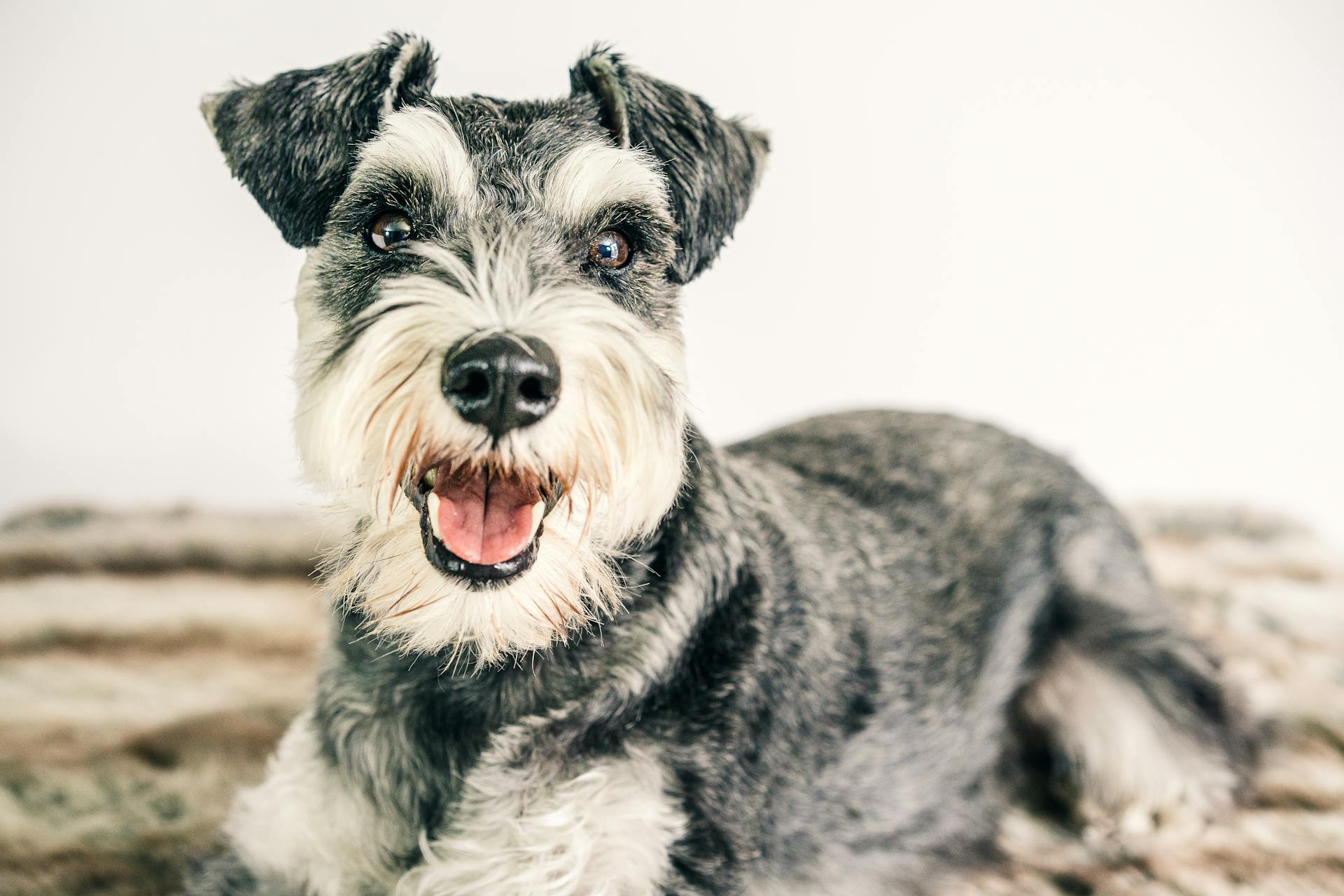
Here's a quick rundown of the breed's characteristics:
Overall, Giant Schnauzers can make wonderful pets for active families who are willing to provide the necessary exercise and attention. However, they're not the best fit for every family, and it's essential to consider their needs and characteristics carefully before making a decision.
Environment
Giant Schnauzers thrive in medium-to-large size homes in the suburbs or large houses in the country or on a farm.
They're not couch potatoes, and their energy levels require regular exercise and mental stimulation.
Their size can be imposing to smaller dogs or pets, so it's essential to socialize them with other animals from an early age.
Giant Schnauzers may exhibit their innate herding tendencies naturally, especially in multi-pet households, so it's crucial to provide them with a suitable outlet for this behavior.
Socializing your Giant Schnauzer with a puppy playgroup or training class will help them learn to "play well with others".
Recommended read: Large Mountain Dogs
Rescue Groups
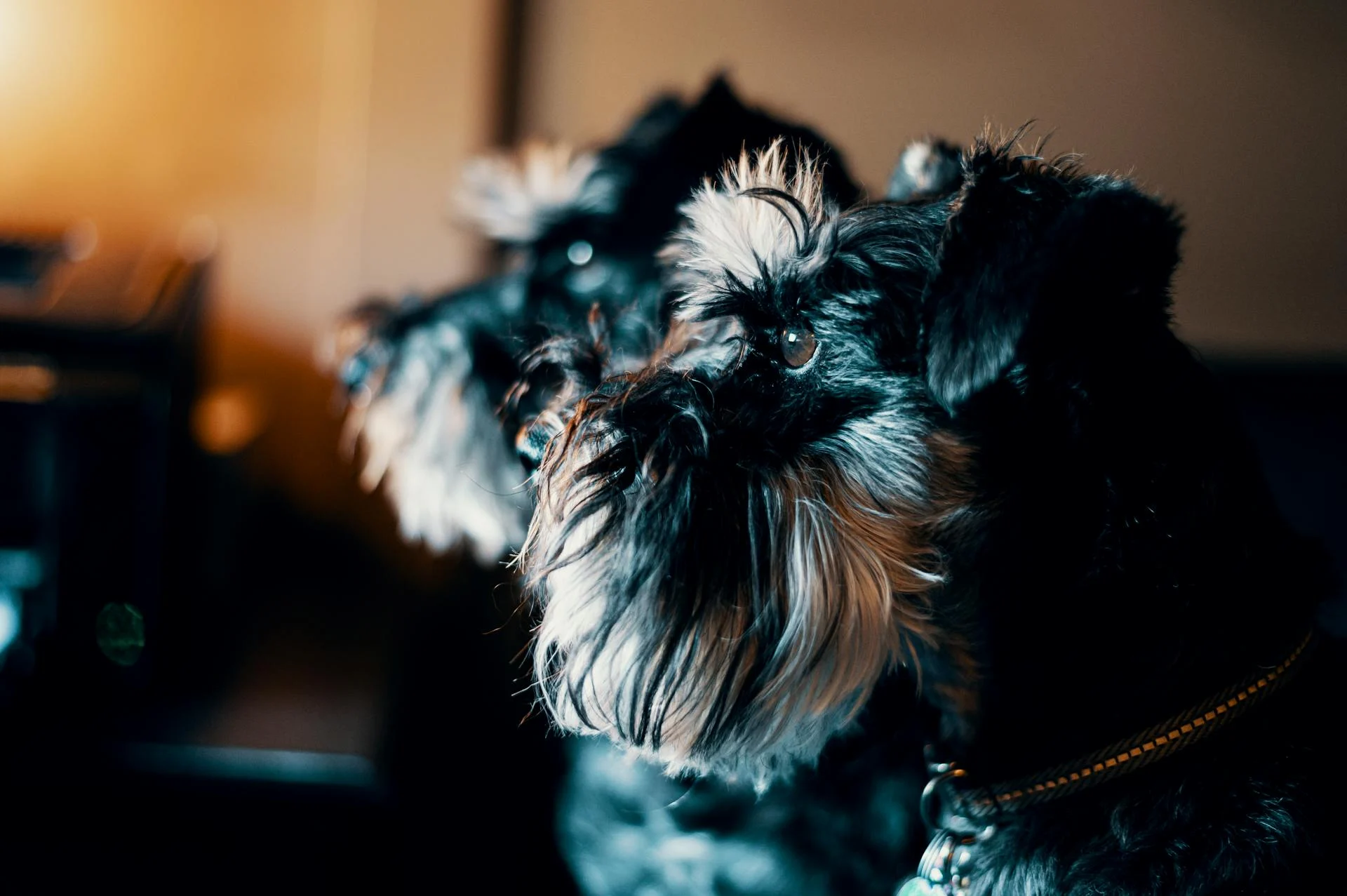
When adopting a Giant Schnauzer, it's essential to consider the unique needs of this breed. Giant Schnauzers are sometimes acquired without proper understanding of their needs, leading to rescue groups taking them in.
If you're interested in adopting a Giant Schnauzer, a nonprofit rescue group is a good place to start. These groups often have Giant Schnauzers in need of adoption or fostering.
You can find reputable rescue groups through online research or by reaching out to local breed-specific rescue organizations. Some notable Giant Schnauzer rescue groups include the Giant Schnauzer Rescue Network, Valley of the Sun Giant Schnauzer Rescue, and Southern California Giant Schnauzer Rescue, Inc.
Some of these rescue groups include:
- Giant Schnauzer Rescue Network
- Valley of the Sun Giant Schnauzer Rescue
- Southern California Giant Schnauzer Rescue, Inc
- Ontario Giant Schnauzer Rescue
- HT-Z Giant Schnauzer Rescue
By working with a reputable rescue group, you can find a loving and well-cared-for Giant Schnauzer companion.
Frequently Asked Questions
What is the cost of a Giant Schnauzer?
The cost of a Giant Schnauzer includes an initial purchase price of around $2,500, plus first-year expenses of approximately $5,940.
Is Giant Schnauzer a good dog?
Yes, Giant Schnauzers can make great pets for active owners who are willing to provide the necessary exercise and training. They're loyal, intelligent, and trainable, but also require a significant commitment.
Do Giant Schnauzers shed a lot?
Giant Schnauzers shed at a moderate rate, but their longer hair and larger size make shedding more noticeable. They don't shed excessively, but their size and coat type can make it seem that way.
Are Giant Schnauzers calm dogs?
Giant Schnauzers are generally calm and quiet, but may become alert and bark if they feel their territory is being threatened. They are loving with family, but may take time to warm up to strangers.
Featured Images: pexels.com
